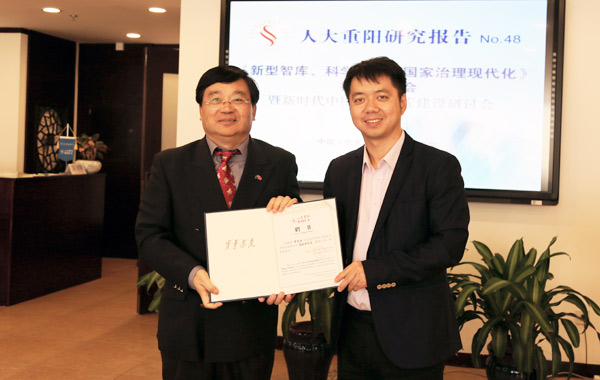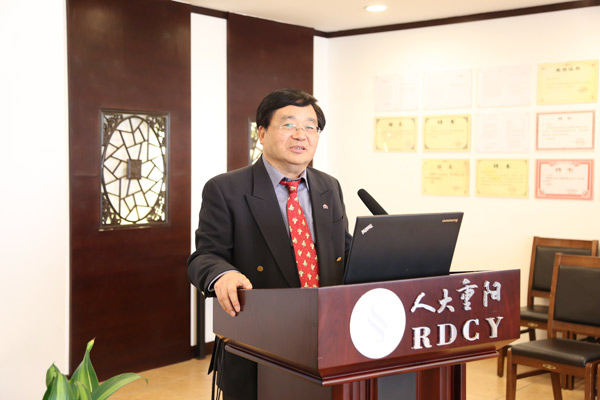Picture
Your Present Location: HOME> PictureRDCY releases research report on new-type think tanks and state governance modernization
On the afternoon of October 10, Chongyang Institute for Financial Studies at Renmin University of China (RDCY) released the 48th research report titled “New-Type Think Tanks, Scientific Decision-Making and Modernization of State Governance”, written by Li Zhongshang, senior fellow of RDCY. The conference invited several experts to conduct in-depth discussions on topics such as the construction of think tanks with Chinese characteristics in the new era and how scientific decision-making promotes the modernization of state governance. Yang Qingqing, committee member and director of Research Cooperation Department of RDCY, presided over the conference.
At the beginning of the conference, Professor Wang Wen, Executive Dean of RDCY, delivered a speech. He gave high praise for the report written by Professor Li and noted that the report comprehensively expounded the development process of think tanks in the past 30 or 40 years from the perspective of soft science. In addition, quoted opinions from his monograph "Think As A Tank: How China influences the World", Wang gave suggestions for the decision-maker on how to make best use of the wisdom of think tanks.
Following the speech, a ceremony was held to appoint Professor Li Zhongshang as senior fellow of RDCY, and Dean Wang Wen issued the certificate.

Dean Wang Wen issues a letter of appointment to Professor Li Zhongshang
In his speech, professor Li Zhongshang reviewed the history of think tanks joining scientific decision-making process in China and summarized the experience and lessons in decision-making. He emphasized that the new task of new era is to promote the modernization of the national governance system and governance capacity. It is necessary to build a complete, scientific and standardized, and effective institutional system in building think tanks, developing modern decision-making science, and realizing the modernization of scientific decision-making and state governance system, so as to better follow the path of socialism with Chinese characteristics.

Li Zhongshang
He pointed out that the world today is competitive, especially in institutional and management fields, which need to build advanced decision-making science and modern think tanks to realize the modernization of state governance. Scientific decision-making requires the intellectual support of scholars and decision-making sciences. The construction of China's think tanks is arduous, with heavy responsibilities and time constraints.
In the discussion session, Li Guoqiang, a researcher at the Development Research Center of the State Council and a senior fellow at the RDCY, mentioned that the construction of think tanks should pay more attention to ideological development and practical construction, and should think about the national strategy and strive to cultivate think tanks talents with a global view point and strategic thinking, thus providing more and better intellectual support and necessary methods for building a modern national governance system and governance capabilities.
Han Caizhen, Professor of the School of International Studies at Renmin University of China (RUC), said that the report has a clear and exquisite description for the positioning, function, characteristics, theory and research direction of Chinese think tank.
Lv Qing, the editor-in-chief of "Think Tank: Theory & Practice", stated that the report is a well-thought-out article with a broad vision. From the perspective of historical view of China's think tanks and international development of Western think tanks in the past century, the report review the history of think tanks, rolling out the historical process of the rapid development of China's think tanks in the era of globalization. It is worth recommending to study hard.
Chen Xiaofeng, a former associate professor at the Institute of Soft Science at RUC, reviewed the long-term efforts and fruitful achievements of RUC in the study on soft science and think tank construction. He said that RUC is the earliest university in China to conduct the research of soft science and a pioneer in the study of Chinese think tanks.























































































 京公网安备 11010802037854号
京公网安备 11010802037854号





